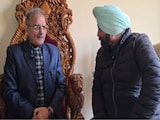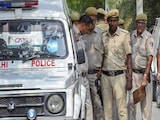The government's decision to cut petrol and diesel prices - after weeks of steady hikes - has produced a sarcastic swipe from Congress MP P Chidambaram, who linked it to the ruling BJP's defeats in bypolls held last week for three Lok Sabha and 30 Assembly seats.
Mr Chidambaram called the fuel price cuts a "by-product of by-elections" and said it confirmed his party's position - that skyrocketing petrol and diesel prices were the result of high taxes, and that the high taxes were the result of the "greed of the central government".
"The results of the 30 Assembly and 3 LS by-elections have produced a by-product... The centre has cut excise duties on petrol and diesel!" the Rajya Sabha MP tweeted today.
"It is a confirmation of our charge that fuel prices are high mainly because of high taxes... And our charge that high fuel taxes is because of the greed of the central government," he added.
The former Union Minister also pointed to vastly superior vote share percentages (for seats the Congress won) and narrow margins (where it lost) as proof of the "wind behind the (party's) sails".
Union Minister Dharmendra Pradhan (who was Petroleum Minister in NDA I) responded, saying the Modi government "stands for being with the people in their happiness as well as in grief".
On Tuesday the BJP was beaten by the Congress in Himachal Pradesh (losing one Lok Sabha and three Assembly seats) and swept away by Bengal's ruling Trinamool (four Assembly seats).
The party also lost prestige battles in Karnataka and Haryana.
Last night the government said excise duties on petrol and diesel would be reduced by Rs 5 and Rs 10, respectively, declaring it would provide a "boost" to farmers - thousands of whom have been fiercely protesting the new agriculture laws for over a year now - ahead of sowing of rabi crops.
The move was hailed by union ministers and BJP chief ministers, who tweeted "thank you" to Prime Minister Narendra Modi. In addition, 10 BJP-ruled states have announced additional cuts. Five of these states - Goa, Himachal Pradesh, Uttar Pradesh, Uttarakhand and Gujarat - will vote next year.
The cuts come after persistent tax hikes left petrol and diesel priced at over Rs 100 per litre in several cities, and over Rs 110 per litre in a few, and large swathes - particularly those from amongst the poorest and most deprived sections - struggling to survive.
Petrol prices, for example, increased by Rs 34 per litre over the past two years (Rs 26 per litre in the past year alone) before the government's "Diwali gift" cuts, which come just months ahead of elections in several key states, including UP and Prime Minister Modi's Gujarat.
Petrol prices set record highs - over Rs 110 per litre - in some major cities
Diesel prices have increased by Rs 29.5 per litre over two years and Rs 25 in the past 12 months.
Opposition parties had repeatedly asked the government to bring down the high prices, pointing out that taxes made up over 50 per cent of the price of petrol and around 47 per cent of diesel.
This week (before the cuts were announced) Congress MP Rahul Gandhi called the government a "pickpocket" and said it had collected Rs 2.3 lakh crore in 2018/19 and Rs 2.58 lakh crore in 2017/18.
Collections jumped 48 per cent - to Rs 1 lakh crore - in the April-July of this financial year alone.
Spiking global oil prices had contributed to pushing retail prices of petrol and diesel to record highs.
At present, though, extended global declines in oil prices after Iran and world powers agreed to resume nuclear talks could increase supplies should the US agree to lift sanctions on Iranian oil.
With input from Reuters















